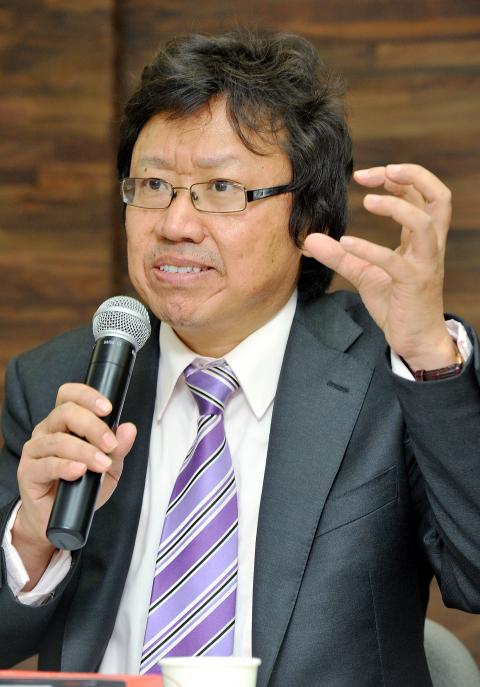Despite the more liberal background of newly sworn-in Chinese Communist Party (CCP) General Secretary and Vice President Xi Jinping (習近平), exiled Chinese democracy activist Wilson Chen (陳破空) said he does not expect substantial changes when Xi takes over as president because he is surrounded by members of the old guard.
“Some people do have some expectations of Xi when he takes office as the new president of China because of his liberal background, but I must say that I’m rather pessimistic about it,” Chen, a US-based researcher on Chinese politics, told a forum co-organized by the Taiwan Friends of Tibet and the Taiwan Association of University Professors yesterday on the potential policy direction of the new Chinese leadership toward Taiwan and Tibet.
“People have some expectations of him, because his father, Xi Zhongxun (習仲勛), one of the founding members of the CCP and the People’s Republic of China, was a liberal-minded person who had a friendly relationship with exiled Tibetan spiritual leader the Dalai Lama, and was opposed to the violent crackdown on the student demonstration on Tiananmen Square in 1989,” Chen said.

Photo: Chien Jung-fong, Taipei Times
“Most of the children of the CCP’s founding leaders are able to continue the political tradition of their parents — Xi Jinping is no exception, as he has earned a good name during his political career serving in local offices,” Chen said.
However, Chen said he was pessimistic on what Xi Jinping may do to instigate a political reform, as he is surrounded by conservatives.
He said that as Xi Jinping climbed to the CCP’s top position, the party’s conservatives launched a counterattack by placing members of the old guard around him to keep an eye on him and prevent him from imposing policies that may hurt their interests.
“Hence, I don’t see a potential for substantial changes in Chinese policies toward Taiwan and Tibet,” Chen said.
Lashing out at the CCP’s policy in Tibet, Chen said it should end its religious repression of Tibet, as religion is the core of Tibetan culture.
“Let’s not talk about what happened in 1959 or 1989 [when massive resistance by Tibetans was met by violent crackdowns]. The policy of requiring Buddhist monasteries to hang portraits of Chinese political leaders is a huge humiliation and disrespect for Tibetan culture,” Chen said. “Can you imagine the Taiwanese government requiring all temples in Taiwan to hang a portrait of President Ma Ying-jeou (馬英九) or the US government requiring all churches in the country to hang a portrait of [US] President [Barack] Obama? That’s unthinkable.”
Chen expressed regret that the Taiwanese government had declined to issue a visa to the Dalai Lama, which he said compromised the values of freedom, democracy and human rights.
“When China says that everything could be discussed under the premise of the ‘one China’ principle, Taiwan should set human rights values as the premise for cross-strait talks,” Chen said. “Many western countries have successfully forced China into dialogues on human rights, so should Taiwan.”

Chinese Nationalist Party (KMT) Chairman Eric Chu (朱立倫), spokeswoman Yang Chih-yu (楊智伃) and Legislator Hsieh Lung-chieh (謝龍介) would be summoned by police for questioning for leading an illegal assembly on Thursday evening last week, Minister of the Interior Liu Shyh-fang (劉世芳) said today. The three KMT officials led an assembly outside the Taipei City Prosecutors’ Office, a restricted area where public assembly is not allowed, protesting the questioning of several KMT staff and searches of KMT headquarters and offices in a recall petition forgery case. Chu, Yang and Hsieh are all suspected of contravening the Assembly and Parade Act (集會遊行法) by holding

PRAISE: Japanese visitor Takashi Kubota said the Taiwanese temple architecture images showcased in the AI Art Gallery were the most impressive displays he saw Taiwan does not have an official pavilion at the World Expo in Osaka, Japan, because of its diplomatic predicament, but the government-backed Tech World pavilion is drawing interest with its unique recreations of works by Taiwanese artists. The pavilion features an artificial intelligence (AI)-based art gallery showcasing works of famous Taiwanese artists from the Japanese colonial period using innovative technologies. Among its main simulated displays are Eastern gouache paintings by Chen Chin (陳進), Lin Yu-shan (林玉山) and Kuo Hsueh-hu (郭雪湖), who were the three young Taiwanese painters selected for the East Asian Painting exhibition in 1927. Gouache is a water-based

Taiwan would welcome the return of Honduras as a diplomatic ally if its next president decides to make such a move, Minister of Foreign Affairs Lin Chia-lung (林佳龍) said yesterday. “Of course, we would welcome Honduras if they want to restore diplomatic ties with Taiwan after their elections,” Lin said at a meeting of the legislature’s Foreign Affairs and National Defense Committee, when asked to comment on statements made by two of the three Honduran presidential candidates during the presidential campaign in the Central American country. Taiwan is paying close attention to the region as a whole in the wake of a

OFF-TARGET: More than 30,000 participants were expected to take part in the Games next month, but only 6,550 foreign and 19,400 Taiwanese athletes have registered Taipei city councilors yesterday blasted the organizers of next month’s World Masters Games over sudden timetable and venue changes, which they said have caused thousands of participants to back out of the international sporting event, among other organizational issues. They also cited visa delays and political interference by China as reasons many foreign athletes are requesting refunds for the event, to be held from May 17 to 30. Jointly organized by the Taipei and New Taipei City governments, the games have been rocked by numerous controversies since preparations began in 2020. Taipei City Councilor Lin Yen-feng (林延鳳) said yesterday that new measures by